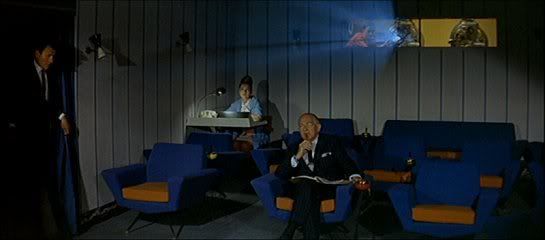Whenever I hear the word "culture," I break out my checkbook.

So many times I've tried to rent Jean-Luc Godard's 1963 film Contempt. Every time I've asked for it, it's always been out -- until now. Quite possibly Godard's masterpiece, at the very least it's the archetypal film about the collision between art and commerce, but that really takes a back seat to its depiction of a marriage suddenly in shambles and the fallout that has for all concerned.
After the opening credits, which are spoken (I wonder if anyone's ever played this on a double bill with M*A*S*H?), we're given an entire scene to contemplate Brigitte Bardot's rear end (while she asks her writer husband, Michel Piccoli, what other parts of her body he likes), then we go right into a scene at Cinecitta where we're told "It's the end of cinema." Bardot's end, or something else entirely?
Piccoli is engaged by crass American producer Jack Palance to rewrite the script for The Odyssey, a film already in production with Fritz Lang (playing himself) at the helm. (Seems Piccoli wrote a Hercules movie that did okay at the box office.) The only other major role is played by Giorgia Moll, who is Palance's assistant and acts as translator since he can't be bothered to learn more than a token phrase in any other language.
To illustrate how much contempt Godard has for the character, he has Palance drive everywhere -- even around the backlot -- and shows him beside himself when a shot of a naked girl swimming in the water appears during the rushes. He's also constantly consulting a book of sayings, but never contemplates what they mean. And the biggest blunder of all is when he gives Piccoli a book of Roman paintings to help him write his script -- for The Odyssey.
The heart of the film, though, is the unbroken 30-minute scene where Piccoli confronts Bardot with his suspicion that she is no longer in love with him and the argument that ensues... and ensues... and ensues... After the tender way they were with each other at the beginning, it's painful to watch them tear each other down. In contrast, listening to Lang and Palance argue about the validity of art in different languages seems less and less important.
Still, Lang gets a great parting shot when he says, "Producers are something I can do without." If anybody knows from experience, it's him. Early on, Piccoli introduces him as the man who made the western with Marlene Dietrich, referring to Rancho Notorious. Lang, of course, much prefers M. I get the feeling Godard does, too.